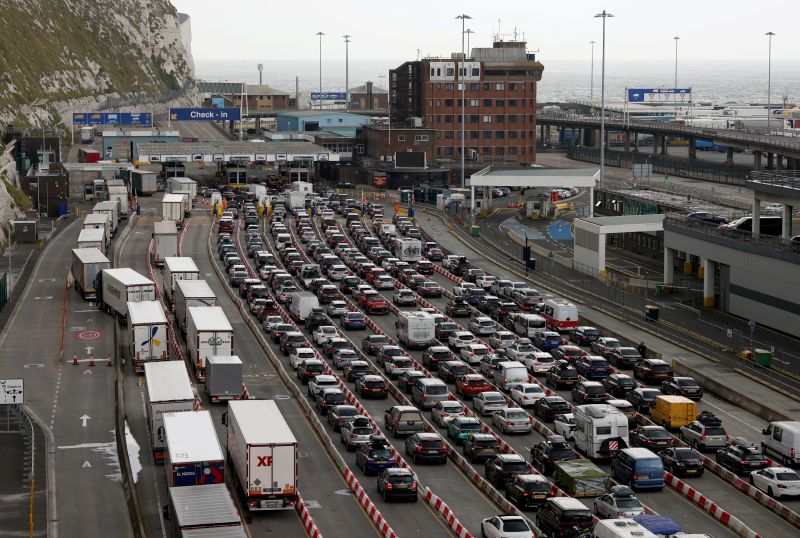
The Complexities of Post-Brexit Trade Negotiations: A Closer Look at the UK-Canada Dispute

Exploring the intricacies and challenges of trade negotiations in the post-Brexit era, specifically focusing on the recent impasse between the UK and Canada.
Unraveling the Post-Brexit Trade Maze
In the wake of the UK's departure from the European Union, the intricacies of post-Brexit trade negotiations have come to the forefront, shedding light on the complexities and challenges that accompany the pursuit of free trade deals. The recent impasse between the United Kingdom and Canada serves as a poignant example of the hurdles that must be navigated in the quest for favorable trade agreements.
DOVER, ENGLAND - JULY 21: Queues of lorries and cars move steadily at the Port of Dover as the busy summer travel period begins on July 21, 2023 in Dover, England. State-educated children finish school today for the summer break and many families are heading abroad on holiday. Since the UK left the European Union, post-Brexit passport checks have led to queues of traffic at the Port of Dover. (Photo by Dan Kitwood/Getty Images)
Nearly eight years after the historic Brexit referendum, the UK government finds itself grappling with the arduous task of replacing its longstanding EU trade deal with Canada. The negotiations, which commenced in March 2022, have encountered substantial roadblocks, notably revolving around contentious issues such as beef, automotive exports, and the export of cheese. These disputes have underscored the formidable nature of post-Brexit trade talks, challenging the UK's aspirations of redefining itself as a global trading powerhouse.
Despite the historical ties and shared affiliations between the United Kingdom and Canada, including membership in NATO and the Group of Seven forum, the trade discussions have proven to be notably thorny. The existing EU-Canada free trade agreement has provided a transitional framework for trade between the two nations, but the UK's endeavor to secure an improved trade deal has encountered significant obstacles, exacerbating the urgency to establish new terms to govern bilateral trade relations.
Navigating Contentious Terrain: Dissecting the Disputes
The focal points of contention in the UK-Canada trade impasse revolve around pivotal sectors, each emblematic of the intricate web of challenges inherent in trade negotiations. The automotive industry, a cornerstone of the UK's economic landscape, faces the prospect of heightened import taxes when exporting to Canada, posing a formidable threat to the sector's competitive edge and market access.
Simultaneously, the expiration of rules governing the export of British cheese to Canada has precipitated a dire predicament for UK producers, who now confront exorbitant tariffs reaching up to 245% of the value of their cheese. This abrupt shift in trade dynamics has reverberated across the agricultural landscape, eliciting concerns about the viability of British exports in the Canadian market.
Furthermore, the steadfast refusal to relax the ban on hormone-treated beef has emerged as a pivotal sticking point, impeding the prospect of Canadian farmers accessing the UK market. This entrenched stance has underscored the divergent regulatory frameworks and standards that underpin the trade negotiations, encapsulating the intricate interplay of sovereignty and market access.
The Road Ahead: Implications and Outlook
Amid the impasse, the ramifications for both the United Kingdom and Canada loom large, prompting a reassessment of their trade strategies and aspirations. The failure to secure an improved trade deal with Canada represents a setback for the UK's ambitions to forge favorable trade agreements outside the EU, eliciting concerns about the nation's trade prospects and economic resilience in the post-Brexit landscape.
The protracted negotiations and the subsequent deadlock have cast a pall over the UK's pursuit of enhanced trading conditions, with experts cautioning that the nation may face more onerous trading conditions than those experienced as EU members. This sobering reality has prompted introspection and recalibration of the UK's trade policy, underscoring the formidable challenges that lie ahead in reshaping its trade dynamics.
Conversely, Canada's steadfast commitment to safeguarding the interests of its businesses, farmers, and workers reflects the nation's unwavering resolve to negotiate agreements that uphold its economic welfare. The resolute stance adopted by Canadian trade minister Mary Ng underscores the imperative of securing trade deals that safeguard Canadian interests, signaling the nation's strategic and principled approach to trade negotiations.







